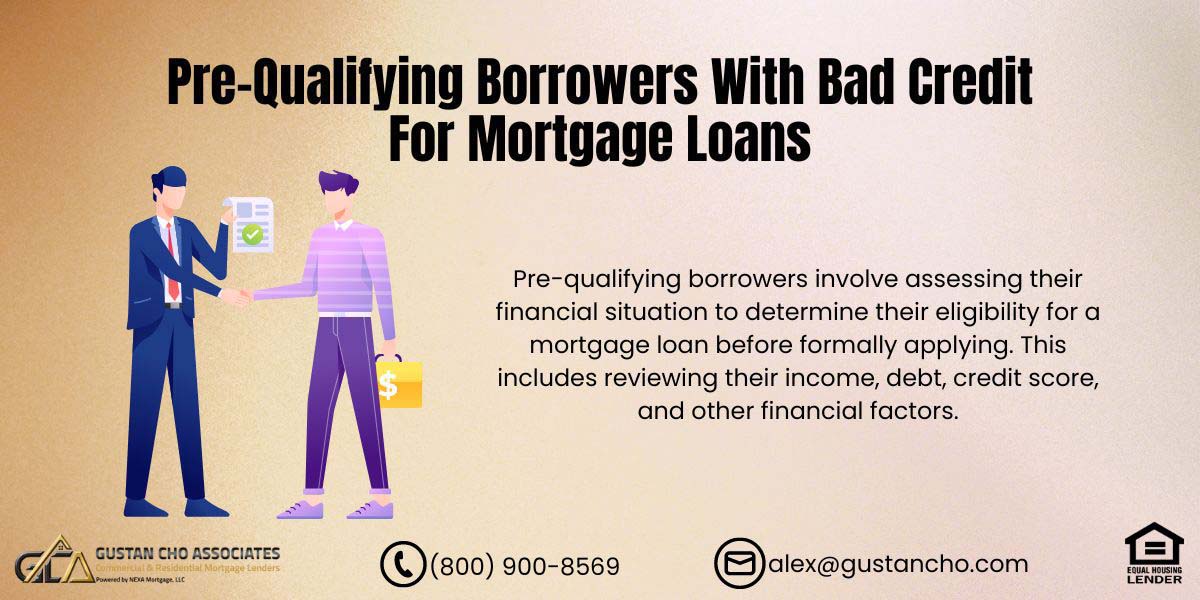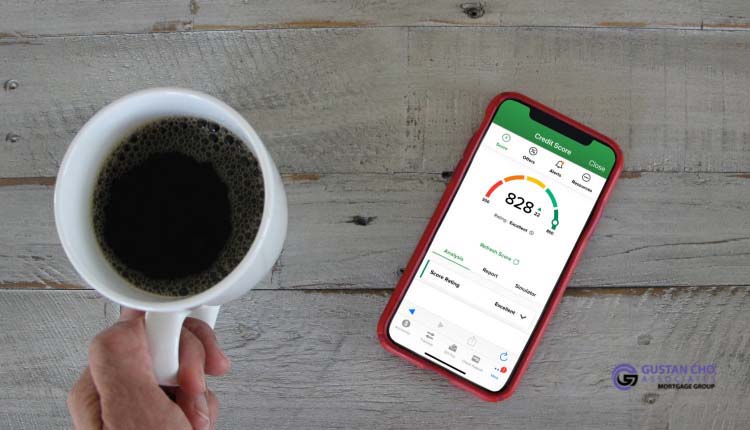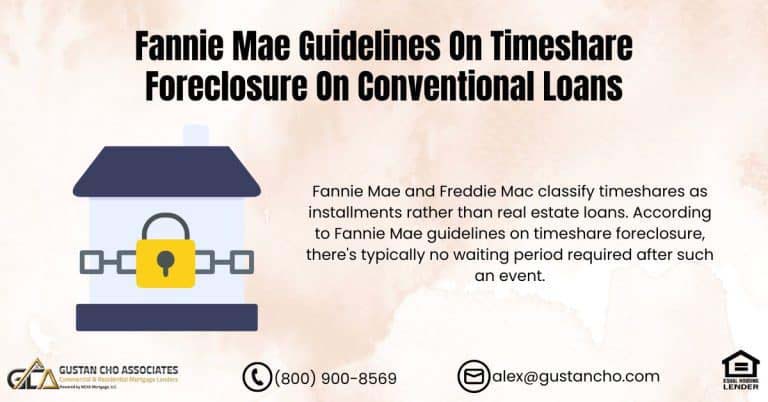In this blog, we will be covering pre-qualifying borrowers with bad credit for mortgage loans. This article on pre-qualifying borrowers with bad credit for mortgage loans is a resource mortgage guide for borrowers and loan officers. New loan officers need to understand that the pre-approval process is the most important stage of the mortgage process.
The number one reason for stress during the mortgage process and last-minute mortgage loan approval is due to the loan officer not properly qualifying mortgage borrowers. Issuing a hasty pre-approval is not the wisest thing you can do as a mortgage loan originator. In the following paragraphs, we will discuss and cover pre-qualifying borrowers with bad credit for mortgage loans.
Steps to Pre-Qualify Borrowers with Bad Credit
Pre-qualifying borrowers with bad credit for mortgage loans can be challenging but possible with the right approach and understanding of available loan products. In this guide, we will cover a step-by-step guide to help navigate the pre-qualification and approval mortgage process.
Understand the Borrower’s Financial Situation
Income Verification: Gather proof of income, such as pay stubs, tax returns, and bank statements. Calculate the DTI ratio to understand the borrower’s current debt obligations compared to their income. A lower DTI improves loan eligibility.
Bad Credit? You Can Still Pre-Qualify for a Mortgage!
Contact us today to get pre-qualified and explore flexible loan options designed for borrowers with bad credit.
Explore Types of Mortgage Loan Options
There are different mortgage loan options for homebuyers. We have government-backed mortgage options as welll as conventional laons.
- FHA Loans: Federal Housing Administration (FHA) loans are more lenient with credit scores. Borrowers with scores as low as 500 may qualify with a 10% down payment or 580 with a 3.5% down payment.
- VA Loans: These loans are available for veterans and active-duty service members and often have more flexible credit requirements. USDA Loans: For rural property buyers, USDA loans offer lenient credit requirements and may not require a down payment. Non-QM Loans: Non-qualified mortgage (Non-QM) loans offer alternatives for those who don’t meet traditional lending criteria, including bad credit.
Down Payment Assistance Mortgage Programs
Down payment assistance mortgage loans are programs designed to help homebuyers, particularly first-time buyers, with home purchasing costs. Here’s an overview of down payment assistance programs: The purpose is to help buyers overcome the hurdle of saving for a down payment and make homeownership more accessible to a broader range of people.
Types of Down Payment Assistance Programs
Pre-Qualifying Borrowers is one of the most important steps in the mortgage pre-approval process. Make sure to have a notepad and pen prior to calling the borrower to take detailed notes.
- Grants (money that doesn’t need to be repaid)
- Low-interest loans
- Deferred-payment loans
- Forgivable loans
Sources of Down Payment Assistance
- State housing finance agencies
- Local government programs
- Non-profit organizations
- Some mortgage lenders
Eligibility Criteria (Varies by Program)
Pre-qualifying borrowers with bad credit for mortgage loans involves understanding their financial situation, exploring suitable loan options, and working with specialized lenders. With the right approach and preparation, it’s possible to secure financing even with less-than-perfect credit. If you need more specific information or assistance, feel free to ask!
- Income limits
- Credit score requirements
- First-time homebuyer status
- Property Location
- Property purchase price limits
Common Requirements For Down Payment Assistance Programs
Obtain the borrower’s credit score. Scores below 620 are typically considered bad credit, but some lenders work with lower scores. Analyze the credit report for any errors or issues that can be addressed. Correcting mistakes can boost the score.
- Homebuyer education courses
- Minimum contribution from the buyer
- Occupancy requirements (usually primary residence)
Benefits of Down Payment Assistance
Down payment assistance programs may have restrictions on the type of mortgage (e.g., FHA, conventional). It could affect interest rates or loan terms. May have repayment requirements if the home is sold within a certain period
- Reduces upfront costs of buying a home
- This may allow for a smaller mortgage loan
- It can help buyers purchase sooner than they might otherwise
How to Find DPA Programs
You can check with state housing finance agencies, consult local HUD-approved housing counselors, and ask mortgage lenders about available programs. Would you like more information on any specific aspect of down payment assistance programs?
- State Programs: Many states offer down payment assistance programs for first-time homebuyers, which can help those with bad credit secure a mortgage.
- Local Grants: Check for local grants and assistance programs to help with the down payment and closing costs.
Seek Lenders Specializing in Bad Credit Loans
Specialized Lenders work with lenders who have experience with bad credit loans. They often have more flexible criteria and understand how to work with challenging credit profiles. Mortgage brokers can help find suitable lenders and loan products tailored to the borrower’s situation.
Struggling with Bad Credit? Let’s Get You Pre-Qualified for a Mortgage!
Reach out now to get pre-qualified and see how we can help you secure a mortgage with bad credit.
Prepare a Strong Application
Receive Pre-Qualification: If the borrower meets the lender’s criteria, they will receive a pre-qualification letter indicating the loan amount they are likely to qualify for. Use the pre-qualification letter to shop for homes within the approved price range.
- CompeEncourage the borrower to pay down existing debts to lower the DTI ratio and improve their credit score. Consider professional credit counseling to develop a plan for improving credit over time.nsating Factors: Highlight compensating factors such as a large down payment, significant cash reserves, a stable job, or a co-signer with good credit.
- Detailed Letter of Explanation: If there are specific reasons for the bad credit (e.g., medical bills, temporary job loss), provide a detailed explanation to the lender.
Submit Documentation: Provide the lender with all necessary documentation for a thorough review. The lender will review the application, credit report, and financial information to determine pre-qualification status.
What is The Main Reason For a Last-Minute Mortgage Loan Denial?
The main reason for last-minute denials or stress in the mortgage process is because the loan officer did not properly pre-qualify borrowers. Loan officers issued a pre-approval letter without properly qualifying borrowers. Training a loan officer cannot be done overnight. Takes a lot of time, patience, and practice. Most borrowers do not have 700 credit scores, perfect credit payment history, have 20% down payment, have a low debt to income ratios, or have steady solid incomes and employment history.
Borrowers Credit Scores and Payment History Profile
Every borrower’s credit and financial profile needs to be carefully and thoroughly reviewed. Make sure they not only meet the minimum federal agency guidelines but also meet the guidelines of your mortgage company. Depending on where loan officers work, they need to know their employer’s lender overlays and need to get familiar with them. Whether you get the borrower through your branch, get them from a lead company, or get borrower through a referral, the first step when dealing with borrowers the initial interview.
Questions To Ask When Pre-Qualifying Borrowers
Prior to taking a formal mortgage loan application, the first step when pre-qualifying borrowers are to ask a series of questions and take detailed notes. Loan officers may want to prepare a questionnaire sheet with an outline of questions to ask or ask your branch or sales manager to see if there are a general form that the office already has. Every loan officer has their own system when it comes to pre-qualifying borrowers and the questionnaire I have listed in this article is how I personally pre-qualify our clients.
Qualifying Borrowers Prior To Issuing Pre-Approvals
Here are the key questions I ask when pre-qualifying borrowers:
- What type of property are you planning on purchasing?
- For those buying a condo and can only qualify for an FHA Loan, the condo complex needs to be FHA Approved
- For those purchasing a 2 to 4 unit building, you can use 85% of the potential rental income as qualified income in the borrower’s debt to income ratio calculations on FHA Loans
- Conventional Loans, you can use 75% of the potential rental income
- Are you under contract?
- If not, when are you planning on buying?
- The reason I ask this question is that many times I get calls by borrowers who are already under contract and got a last-minute mortgage denial or are fed up with their current lender due to delays or other reasons
- What is the price range of the homes that you are planning on buying?
Do you know the range of the property taxes and how much the homeowners’ insurance is on the homes that you have been looking at?
Credit Scores Used To Qualify Borrowers
The lower of all borrowers’ middle credit scores are used for qualification purposes. Now since you have qualified income, loan officers need to find out as much as they can about the borrower’s debts when pre-qualifying borrowers. The first question you need to ask is if they have any car payments and how much. Any student loans. List of all other minimum monthly payments.
Two biggest deal killers with the borrower who have high debt-to-income ratios are car payments and student loans. An average car payment is $700 per month which is equivalent to a $100,000 mortgage loan balance..
Deferred student loans are no longer exempt on FHA loans. Borrowers need to get a payment statement by the student loan provider of what the monthly payment will be if the student loan has been out of deferment. Or 0.50% of the outstanding student loan balance will be used as a monthly debt. Conventional loans allow Income-Based Repayment. FHA loans now allows IBR payments on student loans.
How To Question and Qualify Borrowers
Loan Officers should ask the following questions when pre-qualifying borrowers:
- How is your credit?
- Do you have any credit cards or revolving credit accounts?
- Can we go over each one of your credit card limits and balances?
- Have you filed bankruptcy and if so when was the discharged date?
- Have you had a prior foreclosure, deed in lieu of foreclosure, or short sale?
- And if so, when was the recorded date of the foreclosure and/or deed in lieu of foreclosure or the date of the sheriff’s sale?
- If you had a prior short sale, when was the date of the short sale?
- Have you been timely on all of our payments in the past 12 months?
- Do you have any outstanding collection accounts?
If so, tell me about the outstanding collection accounts. How many are medical collections and how many are non-medical collections?
Pre-Qualifying Borrowers With Bad Credit and Public Records
Do you have any judgments or tax liens?
- Are you renting or living rent-free with family?
- if you are renting, how are you paying your rent and is the landlord a private landlord or a registered property management company?
- With cash or check?
Borrowers can have prior bad credit and as long as they have a 580 credit score. Can qualify for a 3.5% down payment FHA Loan with 580 credit score. However, cannot have late payments in the past 12 months. One or two late payments in the past 12 months may be acceptable with a good letter of explanation. However, cannot have sporadic late payments in the past 12 months and qualify for a mortgage loan.
Worried About Bad Credit? Let Us Help You Pre-Qualify for a Mortgage!
Contact us today to get pre-qualified and explore the best mortgage options available to you.
Pre-Qualifying Borrowers With Lower Credit Scores
For those who say they have lower credit scores, try to find out why. Asking for their credit card information is a great way of finding out the reason why they may have lower credit scores. If you have maxed out credit cards, that will definitely lower credit scores. Paying them down will instantly boost a person’s credit scores.
Mortgage After Bankruptcy and Foreclosure
There is a two year waiting period after a Chapter 7 Bankruptcy discharged date to qualify for an FHA loan. Four-year waiting period to qualify for a Conventional loan. There is a three year waiting period after a deed in lieu of foreclosure or foreclosure and short sale to qualify FHA loans. There is a four-year waiting period to qualify for a Conventional loan after a deed in lieu of foreclosure and/or short sale. There is a seven-year waiting period to qualify for a Conventional loan after the recorded date or date of the sheriff’s sale of a foreclosure.
Pre-Qualifying Borrowers With Collections and Charged-Off Accounts
Can qualify for FHA Loans with outstanding collection accounts and do not have to pay off the outstanding collection account balance to qualify for government and conventional loans. Medical collections do not matter. However, consumers with more than $2,000 of outstanding unpaid collection accounts that are non-medical the following applies. Then 5% of the outstanding balance is used as a borrower’s monthly debt and will be used for debt to income ratio calculations. This holds true unless a written payment agreement has been made with the collection agency and/or creditor.
Next Step After Pre-Qualifying Borrowers Over The Phone
After pre-qualifying borrowers over the phone, loan officers can then direct them to a link to complete an online mortgage loan application, also known as the four-page 1003. Or can take the application over the phone. Make sure to double-check the social security number, date of birth, and the correct spelling of the borrower’s name. Run the tri-merger credit report. If they meet the minimum credit score requirements, then make sure to carefully review the borrower’s overall credit report.
Pre-Qualifying Borrowers Issuing The Pre-Approval Letter
Loan officers need to realize the importance of issuing a solid pre-approval letter. The number one reason for getting a last-minute mortgage loan denial is due to the borrower being pre-approved when they were not properly qualified. Just meeting the minimum mortgage lending guidelines is not enough.
Need to check with lender overlays and make sure that the whole file makes sense. Case scenarios on borrowers loan officers may have questions on need to be presented before an underwriter or an underwriting manager. The loan officer needs to be sure that the mortgage applicant is fully qualified before issuing a pre-approval letter.
FAQs: Pre-Qualifying Borrowers With Bad Credit For Mortgage Loans
- 1. What do pre-qualifying borrowers mean? Pre-qualifying borrowers involve assessing their financial situation to determine their eligibility for a mortgage loan before formally applying. This includes reviewing their income, debt, credit score, and other financial factors.
- 2. Why is the pre-approval process important in mortgage lending? The pre-approval process is crucial because it helps identify potential issues early, reducing stress and the likelihood of last-minute mortgage loan denials. Properly qualifying borrowers ensures a smoother mortgage process.
- 3. What are the steps to pre-qualify borrowers with bad credit? To pre-qualify borrowers with bad credit, it’s important to understand their financial situation, verify income, explore different mortgage loan options, investigate down payment assistance programs, check credit scores, and prepare a strong application with the necessary documentation.
- 4. What are the common types of mortgage loans available for borrowers with bad credit? Numerous mortgage choices exist for individuals with poor credit. FHA Loans allow credit scores of 500 or above with a 10% down payment or 580 with a 3.5% down payment. VA Loans have flexible credit requirements for veterans and active-duty service members. USDA Loans offer lenient credit requirements and no down payment for rural property buyers. Non-QM Loans are an option for those not meeting traditional lending criteria.
- 5. What is the role of down payment assistance programs? Assistance programs for down payments aid individuals looking to purchase a home, especially first-time buyers, in covering the expenses involved in buying a home, enhancing the feasibility of homeownership. These programs may consist of grants, loans with low interest rates, loans with deferred payments, and loans that can be forgiven.
- 6. What are the eligibility criteria for down payment assistance programs? Down payment assistance program eligibility requirements often include income limits, credit score criteria, first-time homebuyer status, property location, purchase price restrictions, completion of homebuyer education courses, a minimum buyer contribution, and occupancy mandates.
- 7. How can borrowers find down payment assistance programs? Borrowers can check with state housing finance agencies, local government programs, non-profit organizations, and some mortgage lenders. Consulting local HUD-approved housing counselors can also be helpful.
- 8. What common questions should loan officers ask when pre-qualifying borrowers? When pre-qualifying borrowers, loan officers should ask about the type of property, existing contracts, price range, property taxes, homeowners’ insurance costs, credit status, history of bankruptcy or foreclosure, and outstanding collections or judgments.
- 9. How do credit scores impact the pre-qualification process? Credit scores are critical in determining eligibility for various loan types. For example, FHA loans require a minimum score of 580 for a 3.5% down payment. Understanding and addressing any credit issues is essential for improving eligibility.
- 10. What are the benefits of properly pre-qualifying borrowers? Proper pre-qualification reduces the risk of last-minute mortgage loan denials, ensures borrowers know their financial standing and helps loan officers issue reliable pre-approval letters. It also streamlines the home-buying process and enhances borrower satisfaction.
If you have any questions about Pre-Qualifying Borrowers With Bad Credit For Mortgage Loans or you need to qualify for loans with a lender with no overlays, please contact us at 800-900-8569. Text us for a faster response. Or email us at alex@gustancho.com. The team at Gustan Cho Associates is available 7 days a week, on evenings, weekends, and holidays.
This blog about Pre-Qualifying Borrowers With Bad Credit For Mortgage Loans was updated on June 21st, 2024.
Pre-Qualify for a Mortgage with Bad Credit—We’ll Help You Find the Right Loan!
Contact us today to get pre-qualified for a mortgage and learn about the options available for you.










